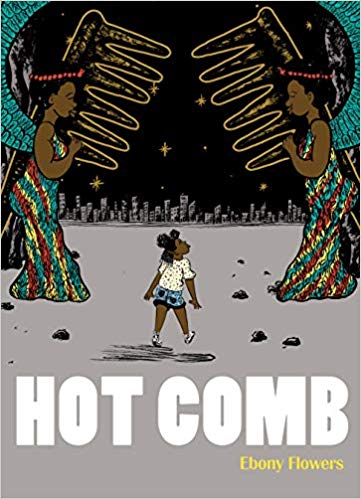Thursday Comics Hangover: One strand at a time

The stories in Hot Comb, Ebony Flowers's debut collection from Drawn & Quarterly, are for the most part centered around Black women — particularly Black women's hair. The narrator of the first story is in fifth grade and, against her mother's wishes, she's eager to get a perm. Why?
"I'm tired of people making fun of me and beating me up," the girl explains apologetically.
As soon as social pressure becomes a real factor in the lives of the girls in these stories, their hair becomes a source of shame. They admire the Black women they see on TV — the narrator of that first story brings a photo of Tatyana Ali, the actress who plays Ashley on The Fresh Prince of Bel Air to her hairstylist only to be told, "you'd need a weave" to get that kind of look. The disappointment is palpable. Once again, fantasy dissolves when placed next to reality.
These aren't all coming-of-age stories. Hot Comb takes a variety of perspectives — including an interlude in which a white man cluelessly raves about his Black girlfriend's continually changing hairstyles: "Every week, I feel like I got a new girlfriend! I love Black women!"
But Hot Comb makes itself clear that it's not about male desire, or male pleasure. It's about what Black women think: of themselves, of each other, of their communities. They talk to each other while they're at salons, they braid each others' hair, they make little refuges from the judgment of the rest of the world.
Flowers is a remarkable cartooning talent. From the title story, impatient readers might think they have her style pegged: the rough black-and-white sketchy autobio cartoonist, like a Julie Doucet or Aline Kominsky-Crumb. But it's readily apparent just a few pages in that every stylistic decision Flowers makes is deliberate, and that she has many more tools in her toolbox than "just" a confessional sketchbook style.
A few times in Hot Comb, pages shatter into grids of tiny panels stacked on top of each other, to great effect. Once, Flowers illustrates a fluttering flock of ducks in a gorgeous silent nine-panel grid that perfectly relays the concerted chaos of birds taking flight.
In another story, she demonstrates a character's OCD tendencies to anxiously pluck hairs from her own head in a series of tiny nervous panels. It's a beautiful comic-book poem: one panel with a hair wrapped around an index finger, springing loose from her head, then a panel reading "and then" and then a panel with a hair pulled taut, and then the hair springs loose and then the word "another," and then a hair falls and the words "bald spot" followed by more panels with more hairs falling to the floor. It is rhythmically and emotionally a note-perfect representation of what it is to have an OCD tendency to pick at your own body.
Hot Comb is a major comics debut — it's the kind of book that will either herald the beginning of a long and successful cartooning career, or it's the debut of a talent who will get swept up by Hollywood and away from comics forever. Whether Ebony Flowers is the next Lynda Barry or the next Marjane Satrapi — or something else entirely — is up to her. But no matter what happens next, we have this book, and that's plenty.